That slow, shuffling walk you've noticed in your loved one isn't just a typical sign of getting older; it's often a red flag for underlying health issues. A shuffling gait, where feet seem to drag or slide rather than lift, can stem from neurological conditions, muscle weakness, medication side effects, or other treatable causes.
This article reveals the 10 most common reasons seniors develop this dangerous walking pattern, from Parkinson's disease to medication side effects. Understanding these causes is the first step toward improving mobility and preventing falls, because every senior deserves to walk confidently and safely.
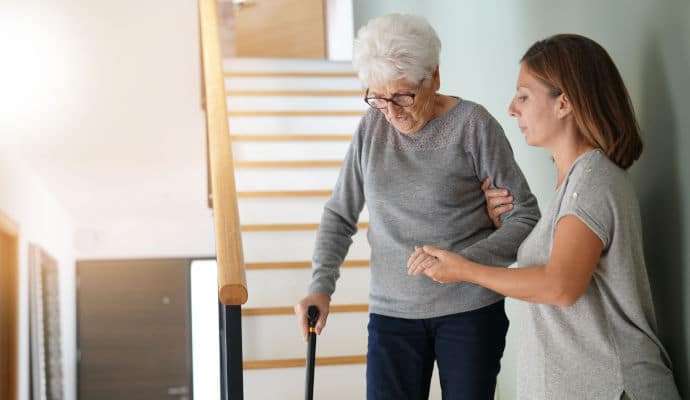
Don’t Ignore a Shuffling Walk in Seniors
You might notice that your older adult shuffles or drags their feet when they walk.
And even if you constantly remind them, they’re still not picking up their feet when walking. They may not even notice that they’re doing it.
So why do seniors shuffle when they walk? The short answer is that they’re not doing it on purpose.
Something is causing someone to start shuffling when they walk. Finding the cause is the first step to helping your older adult walk more safely.
We share the 10 top reasons seniors shuffle when they walk, explain why shuffling significantly increases fall risk, and suggest what to do if your older adult has a shuffling walk.
adinserter block=”1″]
Top 10 Reasons Why Older Adults Shuffle When They Walk
- Weak hips and leg muscles: Age-related muscle loss (sarcopenia) reduces the power to lift the feet, causing a compensatory shuffle.
- Arthritis pain in joints: Stiff, inflamed knees or hips limit range of motion, making steps shorter and more labored.
- Loss of foot flexibility: Tight Achilles tendons or conditions like “drop foot” prevent proper toe clearance during steps.
- Decreased balance: Inner ear changes or neuropathy disrupt equilibrium, leading to cautious, sliding steps for stability.
- Poor vision: Depth perception issues or low-light blindness make seniors hesitant to lift their feet fully off the uncertain ground.
- Fear after a fall: Post-fall anxiety triggers overcorrection, with feet kept close to the floor “just in case.”
- Slow reaction time: Delayed reflexes mean seniors adopt a shuffle to avoid the risk of quick balance corrections.
- Medication side effects: Sedatives or blood pressure drugs can cause dizziness or muscle weakness that alters gait.
- Bad footwear: Unsupportive shoes or loose slippers force the feet to grip artificially, disrupting natural stride.
- Slippery floors: Perceived or actual slick surfaces (like tile or hardwood) encourage a friction-seeking shuffle.
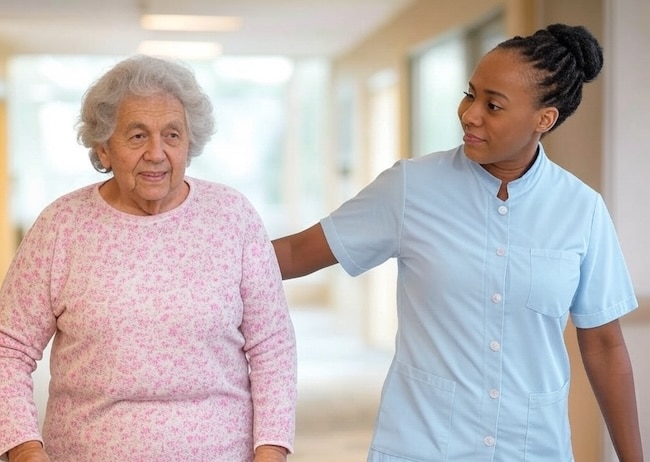
Shuffling Increases the Risk of Falling
It might seem like not picking up your feet when walking isn’t that important.
But if someone shuffles, drags, or does not lift their feet off the ground when walking, they’re at a greater risk of falling.
Shuffling is a common cause of falls because sliding feet can more easily trip on rugs, door thresholds, or even slightly uneven surfaces.
And seniors who shuffle when they walk are more likely to stumble because their shoes can catch on the ground.
Plus, the narrow stance of shuffling feet makes someone more unbalanced than a regular walking stance.
What You Can Do About Your Loved One's Shuffling
An unsteady gait or shuffling walk could be caused by something as simple as slippery floors or as profound as dementia or Parkinson’s disease.
So, if your older adult has started shuffling their feet when walking, scheduling an appointment with their doctor to determine what’s causing it is essential.
To prepare for the doctor’s appointment, check to see if any of these top 10 reasons could be causing them to shuffle their feet.
Unless the reason is apparent and easily corrected, like replacing a too-old pair of loose shoes, it's best to have the doctor do a thorough check-up.
This will help them identify the cause of the shuffling behavior. Once the reason is known, the doctor can recommend improving the situation.
Next Step Try gentle exercises that increase flexibility and improve balance
Recommended for you:
- Sit to Stand Exercise: The Best Way to Improve Senior Mobility
- Reduce Falls with 2 Useful At-Home Balance Exercises for Seniors
- Head to Toe Gentle Seated Chair Exercises for Seniors Improve Range of Motion
About the Author

Connie Chow
Connie was a hands-on caregiver for her grandmother for 20 years. (Grandma made it to 101 years old!) She knows how challenging, overwhelming, and all-consuming caring for an older adult can be. She also knows how important support is — especially in the form of practical solutions, valuable resources, and self-care tips.

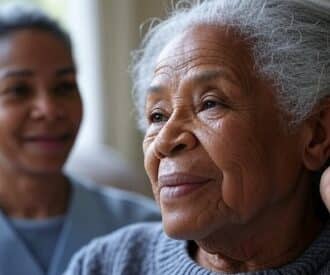
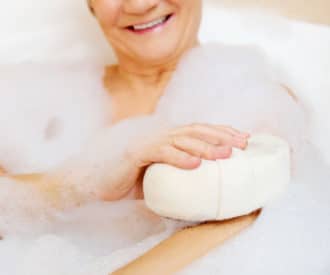
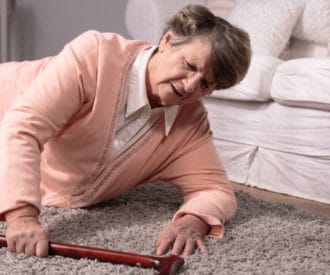

I’m am very concerned about myself. Last year, during COVID, I managed to not get it but my close friend did. She lives in my apartment complex. I’m 64/65, she’s in her early/mid-40s. She thankfully recovered, and I noticed myself feeling upon waking that I had been in a car wreck. Knees hurt, right hip hurt, and this is more than my every-day normal aches and pains. I’m faced with degeneration in both knees and right hip is bone on bone. My legs are becoming weaker. I noticing I can do less and less. It was tough finding a doctor due to Covid, but I’ve seen my PCP and 1 orthopedist who gave me cortisone shots for my knees, which helped about 2 months relief, but now I’m uninsured and waiting for Sept. 1st when Medicare will be covering me. I’m severely depressed as I can’t do things around my apartment without sitting. If I want to make a huge salad for the week, I have to pull a chair into my kitchen. I have bought a cane and a walker and am contemplating a wheelchair. My friend wants to take me out to eat Saturday, and I’m stressing about that because I am so embarrassed with the way I walk. Lately I’ve been noticing my carpet near the metal where the carpet stops and linoleum starts is coming up. I have little loops of carpet everywhere. I put 2 and 2 together and realized I’m shuffling when I walk. I have no strength in my legs. The only time I’m pain free is when I’m sitting and I’m afraid that is what got me in this delimma. It’s like osteoarthritis came on fast with me and now my lower back too. I’m overweight, at 5 feet 7 inches, I weigh 300 pounds. I feel like my life is over, and really, if it weren’t for my cat that I love dearly, I’d be wanting to check out. Doctor pulled me off anti-inflammatory meloxicam because it was affecting my kidneys so I’m worried about them too. The only thing I can take is Tylenol which really does nothing, and I have a prescription for Ultram which really does nothing either. I’m beside myself. I have worked at home the past 25 years as a medical transcriptionist and at least I can still do that, although it’s hard a lot of mornings to even get out of bed, and I’m so slow getting around. Still I try my best to make some extra $$ to supplement my retirement. I just hope this doctor I’m seeing next month on the 2nd can help me. They have radiology, physical therapy, and pain management in their practice, so it’s gotta be a win-win situation for me. I’m too young to be feeling this bad. I’m afraid of falling. Getting in the tub to get a shower is scary for me.
We’re so sorry to hear about your situation. It’s good that you’ll soon be able to see doctors who will hopefully be able to find you some relief and treatment to improve your conditions and reduce the pain. You may also want to ask them if they can “prescribe” physical therapy so it could be covered by insurance (check with your insurance company to see if this is possible).
These articles may have suggestions that will help:
– 8 Tips for Arthritis Pain Relief https://dailycaring.com/7-tips-arthritis-pain-relief/
– 10 Simple Arthritis Aids Help Seniors with Everyday Tasks https://dailycaring.com/10-simple-arthritis-aids-help-seniors-with-everyday-tasks/
– 3 Hip Arthritis Exercises for Relieving Chronic Pain https://dailycaring.com/video-3-exercises-for-relieving-arthritis-pain-in-hips/
– #9 is a shower bench that might be helpful – 10 Helpful Products Improve Bathroom Safety for Seniors https://dailycaring.com/10-helpful-products-improve-bathroom-safety-for-seniors/
I feel overwhelmed in the way you can or need to get to any helpful idea’s. The information starts with “click on subjects” but I feel I never get, like just one or two suggestions, but instead I feel I could spend all day I never quite sure just which one might help.
Maybe start with one thing and suggest trying this out and see if it might work. By the time I start with this page and click and then click again, etc etc. I have lost interest and just end the whole looking and reading. To much INFORMATION TO ABSORB!!!
You might find it helpful to hire a geriatric care manager who could answer specific questions and help you focus only on what you need to know. Find out how to find one at A Geriatric Care Manager Helps Seniors and Families Navigate the System https://dailycaring.com/how-geriatric-care-manager-can-help-you/
I am 87, healthy and strong mentally and physically, med free, pain free, and able to walk briskly with no shuffling.I have had friends my age and younger who shuffle somewhat because of just being super careful not to trip or fall.Bad vision and a loss of strength were the reasons. Their shuffling was a logical result of those problems.i cannot se any reason why theircareful and slow gait could harm them. It seems that actually it would help them to avoid injury.To be sure, the shuffling might be a sign of a disease in some people. However, I do not see why shuffling could be in itself harmful.
It’s great that you’re in such good health. In the article above, we address why walking with a shuffling gait increases fall risk and the main causes, some of which are signs of a health condition that requires treatment.
Hydrocephalus or “Water on the Brain” could be an issue. Feet shuffling is a symptoms.
That’s a great point. One of the symptoms of hydrocephalus in older adults is difficulty walking, shuffling or feet feeling like they’re stuck. More info here – https://www.mayoclinic.org/diseases-conditions/hydrocephalus/symptoms-causes/syc-20373604
The above infomation has been very helpfull i saw 2 specilists in the old mans Clinic at the Q M C 2 years ago they ruled out Parkinson dementure i also had a Head scan do you think a couse of ACUPUNCTRE WILLhelp
If you’re having symptoms of a serious health condition, it’s important to speak with a licensed medical professional to find out what could be causing the issues. They would be the best people to ask if certain therapies would be helpful or not.
I agree with that.
I am 101 and can still walk without the aid of a cane or walker.Slowly and for short distances around the house,etc.I do not need a wheelchair and when I go out,my son helps me and holds my arm. I can climb up stairs,too….but not too many.Hey,at 101 I am not complaining !
That’s fantastic!!
I am a 59 yr old male.I have Parkinson disease. When I walk I shuffle my feet and have a tenacity to fall. What type of exercises can I do to straighten my leg muscles. I will be starting school in a few weeks and do not want to fall while going from class to class
Since you have Parkinsons, it would be best to speak with your doctor and/or a physical therapist to find out which exercises are appropriate for your health conditions and current physical abilities.
We’re not medical professionals, so we can’t recommend specific exercises and don’t know how exercise will affect your balance and stability. However, using your own best judgement, you may find that gentle exercise can help you improve overall strength and balance. Please use caution when exercising to avoid injury.
You might find these articles with exercise suggestions to be helpful:
— Seated Tai Chi for Seniors: 3 Simple Routines Improve Flexibility and Well-being [Video] https://dailycaring.com/seated-tai-chi-for-seniors-3-simple-routines-improve-flexibility-and-well-being-video/
— Head to Toe Gentle Seated Chair Exercises for Seniors Improve Range of Motion [Video] https://dailycaring.com/head-to-toe-gentle-seated-chair-exercises-for-seniors-improves-range-of-motion-video/
— Easy & Effective 10 Minute Chair Exercises for Seniors https://dailycaring.com/video-easy-effective-10-minute-chair-exercises-for-seniors/